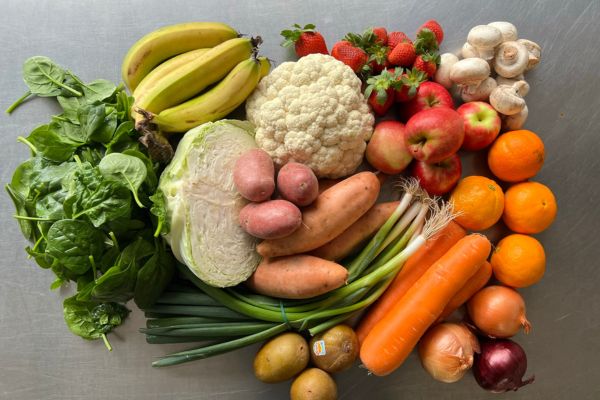Keeping It Fresh: How to Store Fruit, Veg & Herbs at Home
Ever wondered why your cucumbers go mushy when left next to apples, or why basil wilts in the fridge but rosemary soldiers on? The way we store our fresh produce has a huge impact on how long it lasts - and how good it tastes. Here in Western Australia, we’re lucky to have incredible seasonal produce, but keeping it at its best sometimes takes a little know-how.
The Secret Life of Ethylene
Many fruits naturally release a ripening gas called ethylene. It’s harmless to us, but it speeds up the ageing process of everything around it. Store an apple next to a cucumber and before you know it, the cucumber is soft and sad.
To make the most of your WA produce, it helps to know who the culprits are (the ethylene producers) and who’s most sensitive to them.
Ethylene Producers (let off ripening gas)

- Apples (think Manjimup, Donnybrook, Perth Hills)
- Bananas (mostly imported but still common in WA homes)
- Pears (grown in the Southern Forests)
- Stone fruit – peaches, plums, nectarines, apricots (Albany, Swan Valley, Gingin)
- Avocados (Pemberton, Manjimup)
- Kiwifruit (Pemberton)
- Tomatoes (grown across the state)
- Mangoes (Broome, Carnarvon, Kununurra)
- Melons, rockmelon/cantaloupe (Gascoyne, Ord River)
- Brown Onions (Myalup, Gingin, Wanneroo) – store at room temperature in cool dark place away from potatoes.
- Spring onion
Ethylene Sensitive (spoil faster near producers)
- Cucumbers
- Leafy greens (lettuce, spinach, kale, Asian greens)
- Carrots – keep in plastic bag or lidded container to maintain moisture and firmness
- Broccoli & cauliflower (Albany, Wanneroo, Manjimup)
- Zucchini
- Strawberries (WA has some of the best in Wanneroo, Bullsbrook, Albany)
- Fresh herbs (coriander, mint, dill)
- Potatoes & sweet potatoes (Pemberton, Manjimup) – store at room temperature in cool dark place
Tip: Keep producers and sensitive veg in separate crisper drawers or bags.

Vegetable Storage Tips
- Tomatoes – Leave at room temp until ripe. Refrigerate only if fully ripe (and bring back to room temp before eating - the fridge can be the thief of flavour).
- Zucchini – Crisper drawer in foil.
- Cucumber – Crisper drawer in foil.
- Capsicum – Keep whole in the fridge; once cut, store in a sealed container with a little paper towel.
- Sweetcorn – Best eaten quickly. Crisper drawer wrapped in foil with husks on for 2–3 days.
Fruit Storage Tips
- Watermelon – Whole at room temp; cut pieces in the fridge in a sealed container – this makes it get eaten faster!
- Stone Fruits – Ripen on the bench, then refrigerate once soft.
- Cherries – Straight into the fridge, unwashed, in a breathable container. Wash just before eating.
- Strawberries – Remove any soft ones, keep in the fridge in a single layer on absorbent paper. Eat as quickly as possible (ideally within 1-2 days) for maximum flavour. Don’t wash until ready to eat. I prefer them at room temperature.
Herbs: Soft vs Woody
- Soft herbs (basil, mint, dill, coriander): best kept in jug with stalks/roots in water and plastic bag over jug secured with elastic band.
- Basil stores in the fridge for a very short time. It tends to go black if bruised when handling, or if too cold. Store as above.
- Mint, dill and coriander last longer wrapped in damp paper towel inside a container or as above.
- Woody herbs (rosemary, thyme, sage, oregano, bay):
- Wrap in damp paper towel and refrigerate, or pop upright in a jar of water.
- They also freeze beautifully in oil (use ice block trays), or dry easily for year-round use although flavour will not be as strong.
The Takeaway
Storing your WA fruit, veg and herbs with care means less waste and more flavour. Keep ethylene-producing fruits away from sensitive veggies, give your herbs the right treatment, and you’ll be rewarded with produce that stays fresh longer - just as our local growers intended.



1 comment
Great information 🥦🥒🥬🍆🍅🥕🙏